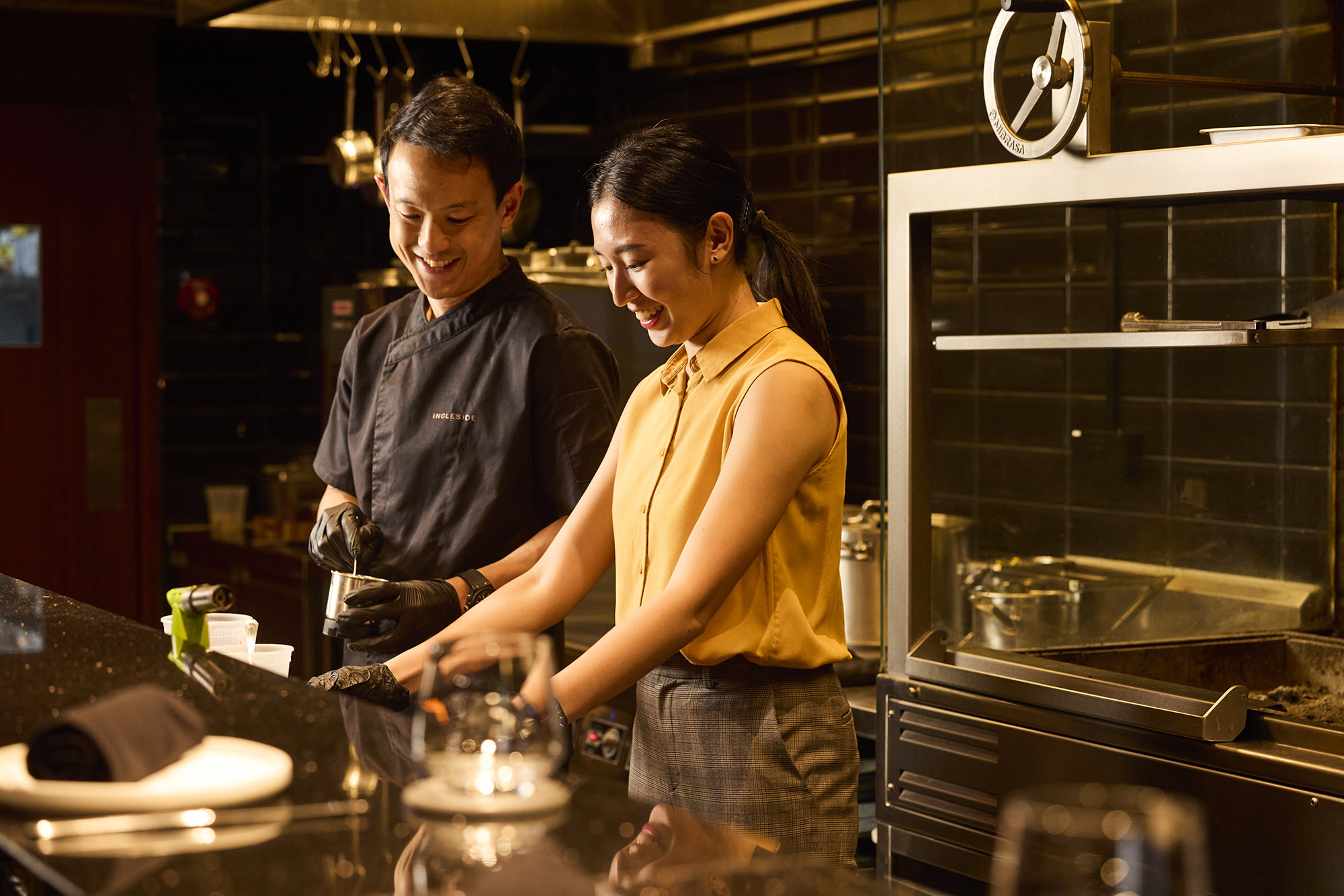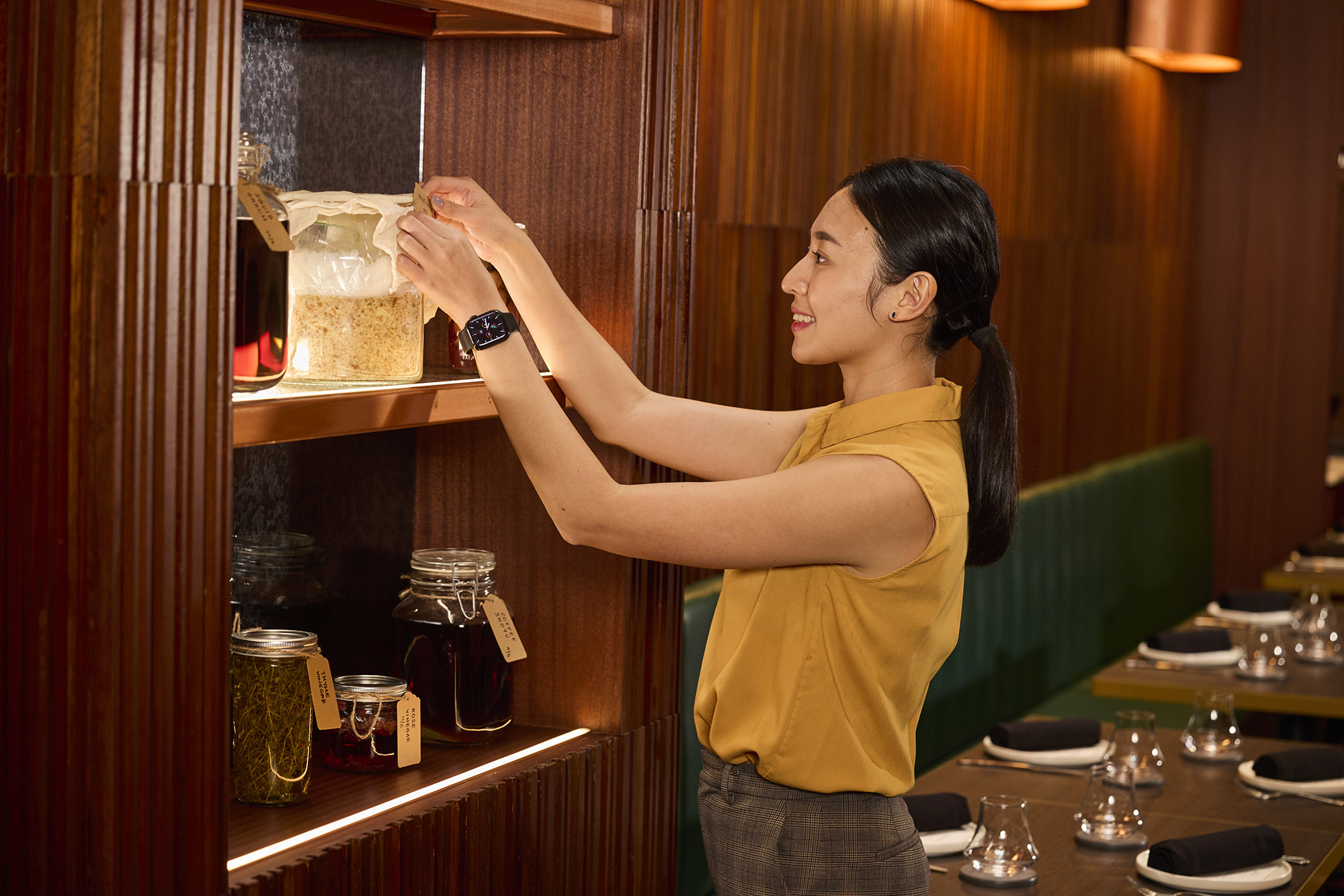4 October 2024
The Magic of Flavour
Ms Jana Jusman (Science ’18) melds ancient fermentation techniques with modern culinary creativity. In the process, she’s redefining what it means for something to taste good.
WHO SHE IS: Ms Jana Jusman’s culinary journey has taken her from the halls of NUS to the bustling kitchen of Tanjong Pagar’s hottest new restaurant, Ingleside. With a deep passion for food science and a relentless drive to push the boundaries of traditional dining, Ms Jusman is someone to watch in Singapore’s bustling F&B scene.
Tanjong Pagar has gained a reputation as a hotspot for innovative dining concepts. The most recent of these is Ingleside, a trendy eatery that has put a fresh, modern twist on fermented foods.
“Fermentation has been used for centuries to create Asian staples like kimchi, miso and soy sauce,” says Ms Jana Jusman, who is the restaurant’s Head Fermentation Specialist. “These foods not only preserve ingredients
but also develop rich, umami flavours essential to Asian culinary traditions.”
The team at Ingleside incorporates these classic elements of fermentation into modern dining: dishes they whip up include a miso made from the trimmings of the restaurant’s brioche and their take on garum, a fermented fish sauce, using
alternative ingredients. These ferments are used extensively across the menu at Ingleside to bring out the flavours of their dishes. “It’s not something that we serve on its own, but without our ferments, the dishes just won’t taste
the same,” she emphasised.
Early reviews of Ingleside have been overwhelmingly positive, with The New Paper summing it up best, writing, “Ingleside isn't just a restaurant; it's a dare to the culinary world —
a declaration that tradition and innovation can coexist, and the results are absolutely electrifying.”
FINDING FERMENTATION
It can be easy to write off fermentation as a passing fad. But one just has to look at the level of rigorous study and precision that goes into the process to realise that it is anything but. Ms Jusman points to her time at NUS, where she first studied
the culinary form as a food science major. “Each agent reacts with its base differently and things like temperature and humidity all play a part in how a ferment will turn out,” she explained. “There’s a real precision to the
process that takes time to perfect.”
She had the chance to put theory to the test during her Honours programme, where she worked on Sachi, the world’s first wine made from soy whey. “Working on that project was a game-changer for me,” she recalled. “I was captivated
by the way a simple microbiological process could transform the flavour and properties of a product. It was like unlocking a whole new world of culinary possibilities.”
 Ms Jana Jusman (right) with her husband, Chef Louis Chan
Ms Jana Jusman (right) with her husband, Chef Louis Chan
That experience made Ms Jusman realise that fermentation was her calling. Following a series of work stints at food companies, she decided to join forces with her husband, Chef Louis Chan, and they opened Ingleside together in May 2024. Here, the duo has seamlessly blended their expertise, with Ms Jusman overseeing the fermentation process and her husband crafting innovative dishes that showcase the depth and complexity of these unique flavours.
“We wanted to create a restaurant that celebrates the art of wood-fired cooking, dry-aging, and, of course, fermentation," Ms Jusman explained. "It's not just about the end-product, but the entire journey of transformation that fascinates us."
One of the standout dishes on their menu is the Heirloom Tomato Salad, which showcases the contrast between fresh and fermented ingredients. "We serve the salad with both fresh and fermented tomatoes," described Ms Jusman. "This allows our guests to experience the interplay of flavours and textures, and really understand how fermentation can enhance the natural qualities of an ingredient.”
The magic of Ms Jusman’s ferments takes place in a dedicated room in Ingleside, tucked away within the kitchen. Housed in here are specialised equipment like fermentation vessels, temperature and humidity controls, alongside jars of fermentation agents like yeast and sugars. The team that works in this room is fueled not only by creativity and curiosity but also by a strong commitment to sustainability.
Reducing kitchen waste is a driving force behind many of their efforts. "We're always looking for ways to repurpose ingredients that would otherwise be discarded," Ms Jusman said. "Whether it's coffee grounds or bread trimmings, we try to find creative ways to incorporate them into our ferments and dishes."
 Ms Jana Jusman with one of her ferments
Ms Jana Jusman with one of her ferments
WHAT’S COOKING
As Ingleside continues to evolve, Ms Jusman’s role has expanded from fermentation to include education. She now plays a crucial part in briefing the restaurant's staff on the fermentation processes, ensuring that they can confidently explain the unique flavours to customers. "It's important to me that everyone on the team understands the story behind the food we serve," she said. "Fermentation can be a bit of a mystery to some people, so we want to educate and engage our guests, not just impress them with the end result."
Looking ahead, Ms Jusman and her husband have ambitious plans to further integrate fermentation into their culinary offerings, including the possibility of incorporating fermented elements into their cocktail menu. There’s more innovation to come, she promises. “The possibilities are endless. We're just scratching the surface of what can be achieved with these ancient techniques.”
Text by Keenan Pereira. Photos by Aik Chen.